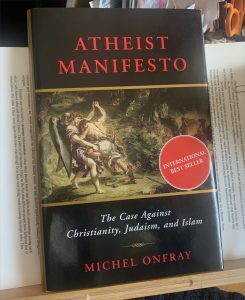One more time.
- Atheology
- This term is the author’s counterpart to theology.
- The idea of atheism goes back to the Bible, and included those who believed in a different god than yours.
- Early thinkers who criticized the church even if they did not deny God, were persecuted and killed; mostly now forgotten.
- We may be in a new era of movement, from the old monotheisms to the atheism of tomorrow
- There are three challenges: deconstruct the three monotheism; deconstruct Christianity; deconstruct theocracies. And then build a new ethic and morality, an atheology.
- Monotheism
- The Holy Books came about through elementary historical processes; they were not “revealed”; Hebrew script did not exist when Moses did; and so on.
- Holy Books were thought to include everything worth knowing, so other books, even rival versions of the holy ones, were banned, or burned. Thus hatred of science and any study that distracts from religious practice. And so religions impeded the progress of Western civilization.
- In science the church has always been wrong about everything. It condemns any hint of materialist theories; thus it condemned Bruno, Galileo. The church missed all the major discoveries of ten centuries. Paul called for all knowledge to pass away – included even the study of the Bible.
- The Monotheisms disdain what is real in preference for the ethereal. Their ideas of paradise align with their hatred of women, condemnation of homosexuals and abortion, celebration of castration and other maiming rituals.
- Christianity
- In his era many besides Jesus made grandiose claims; stories about heroes born of virgins and announced from heaven were commonplace. It took centuries for various stories about Jesus to be sorted out from all the others and gathered, never mind their improbabilities and internal contradictions. (And many were left out.)
- The religion itself was the creation of Paul of Tarsus, and reflects his neuroses: originally a fundamentalist Jew, his “conversion” in 34 was some kind of hysterical pathology. He was inclined toward humiliation, misogyny, slavery. Paul never met Jesus, had read no gospels, had no education beyond the OT. He hated intelligence and culture.
- The religion became totalitarian with Constantine, who made Christianity the official Roman religion in 312. He gained thereby Christian obedience, executed philosophers, and persecuted non-Christians (pagans and Jews).
- Theocracy
- Scholars estimate that monotheism’s three books were twenty-seven centuries in the making. Written after centuries of oral transmission. Clerics forbid direct reading of the texts. None of the four evangelists knew Jesus; they recorded stories told orally for decades. Final versions of Hebrew and Islamic texts were not finished until about 1000 CE.
- The idea of worshiping one god likely arose as late as the 3rd century BCE, by the Jews, to support the existence of their small, threatened people. The founding texts are full of contradictions; any war leader can cherry-pick to find justification for his actions. War is forbidden, but forever practiced; commandments are taken to apply only to certain peoples.
- Monotheism is fixated on death, in the name of God. The Jews invented monotheism, to justify their annihilation of rival tribes. Paul wanted the whole world for Christ; so centuries of crusades, massacres, slaves, genocides.
- Islam adopted all the former two’s worst legacies; they are the chosen people, others subhuman. Holy wars. A world of friends and enemies, binary logic, no subtlety.
- We should leave all this behind, fight for a post-Christian secularism, neither Bible nor Koran. There is only one world, and focus on the afterlife deprives us of enjoying that one.






